King Charles' lavish coronation amid cost of living crisis is retro-patriotism in the style of Brexit – Joyce McMillan
The website invites me to type in my postcode; but among the five celebratory events it finds around Edinburgh – two of them online, and one mysteriously in Leicestershire – street parties are there none. Even in Scotland’s capital, it seems, enthusiasm for the coronation is scanty; and indeed last week, a YouGov UK poll – commissioned by the anti-monarchy group Republic – found that 52 per cent of those questioned were completely or largely uninterested in the coronation, and only 15 per cent were “very interested”.
It would be hard to detect any of that, though, from the conduct of some sections of the British media, which – whenever confronted with a royal event – seem unable to avoid slipping into a default mode of worshipful reverence and assumed national unity. On Sunday night, for example, I found myself watching agape as ITV news treated the nation to two royal items in one short bulletin.
Advertisement
Hide AdAdvertisement
Hide AdThe King and Queen, it said, had attended an Easter Sunday service in the run-up to their coronation; and later, it imparted at some length the news that instead of going from Buckingham Palace to Westminster and back in the gold coronation coach, our modernising monarch and his consort would boldly make the outward journey in a newer coach, with electric windows and air conditioning.
All of which is a pity; because in terms of real journalism, there is a story to be told about tone-deafness of a 21st-century monarchy which – in the middle of a savage cost-of-living crisis – was offered the option of a slimmed-down coronation event, and opted instead for the full-strength celebration, costing an estimated £100 million, and the same extravagant displays of gold, glitter and pageantry associated with the coronation of Queen Elizabeth, 70 years ago.
For many, the pain of their present economic plight is only made sharper by the casual assumption, in so much of our public debate, that we are all perfectly happy with this untimely parade of inherited wealth and privilege, and even – heaven help us – cheered up by it; and like so much else in British public life, the monarchy, for all its travails, seems if anything to be subject to less intelligent debate about its role and future than it would have faced a generation ago.
All of which raises some interesting questions about exactly what is being defended, in 2023, when proponents of a continuing UK talk about the importance of the Union, and of British identity. In Northern Ireland this week, for example, we saw some members of the Democratic Unionist Party adopting positions on Northern Ireland’s relationship with the UK so intransigent, and so profoundly reactionary, that if they had been mirrored by DUP negotiators 25 years ago, the Good Friday/Belfast Agreement – with its subtle understanding of complex identities – would simply never have been reached.
And a comparable, if less extreme, problem seems to affect unionists in Scotland, currently celebrating the spectacular meltdown of the SNP; in that very few of them, in defending the Union, ever seem to give much thought to what might be done to make the Union more flexible and less archaic, in many of its institutions and attitudes. There are some UK politicians and thinkers who focus on these issues, of course; it remains to be seen, for example, how much of Gordon Brown’s latest vision for a reformed and devolved UK will make it through into Keir Starmer’s general election manifesto.


What’s clear, though, is that that reform agenda has relatively little traction in England, where the general assumption is that the answer to the country’s current woes is simply to kick the Tories out, and replace them for a few years with a Labour government elected on the same terms, by the same system, and with the same unabridged executive powers. And it’s certainly possible that an excellent economic performance by a Starmer government could reduce the pressure for constitutional change, at least for a while.
Yet doubts remain about the long-term stability of Scotland’s position, and those of Wales and Northern Ireland, as sub-states with no entrenched powers, in a country where all the cultural forces, for the last decade, have been reflecting an aggressive doubling-down on the institutional structures of Britain’s imperial past. From the forcing through of a disastrous hard Brexit for which Scotland and Northern Ireland did not vote, to the UK Government’s obnoxious “war on woke”, its increasing hostility to the 1998 devolution settlement, and a gilded coronation staged with minimal public debate at a time of real economic suffering, the story of the UK in recent years has not been one of reform and renewal; but rather of a reactionary retro-patriotism made flesh, and often amplified through a compliant media.
And whatever troubles may afflict the independence movement in Scotland – or other opponents of the current UK settlement – it seems clear that that “retro” model of Britishness is no longer viable as a long-term vision for the Union. In Scotland’s 2014 referendum, I eventually became a “yes” voter – after decades of work on UK constitutional reform – because I was exhausted by the negativity, the lack of fresh ideas, and the endless authoritarian scaremongering of the “no” camp, which seemed to have nothing else to offer. And unless advocates for the UK and the Union begin to offer voters a transformative future as well as a weighty past, the Union they seek to defend will remain increasingly brittle, and open to challenge from any effective political force less encumbered by the defence of supposed past glories, and more interested in a just and sustainable future, for all of us in these islands.
Comments
Want to join the conversation? Please or to comment on this article.
